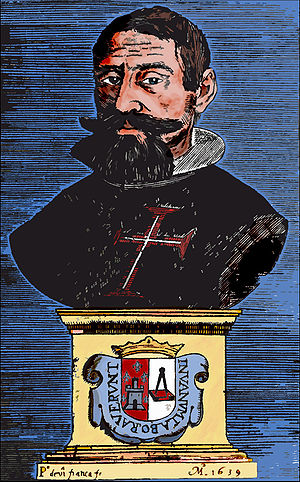Manuel de Faria e Sousa
This article contains wording that promotes the subject in a subjective manner without imparting real information. (August 2013) |
Manuel de Faria e Sousa (Portuguese pronunciation: [mɐnuˈɛl dɨ fɐˈɾiɐ i ˈsozɐ]; Spanish: Faria y Sousa; 18 March 1590 – 3 June 1649) was a Portuguese historian and poet who frequently wrote in Spanish.[1]

He was born into a Portuguese noble family and studied in Braga before serving the Bishop of Porto. Apart from his time with the Portuguese embassy in Rome from 1631 to 1634, he spent most of his later life in Madrid, where he died in June 1649. He was married to Catarina Machado, the "Albania" of his poems.
His early work, Epitome de las historias Portuguezas (Madrid, 1628), was well received. However, some of his commentary on Os Lusíadas and the poetry of Luís de Camões[2] drew the suspicion of the Inquisition, leading to his temporary imprisonment and the loss of his salary. Despite this, he continued writing, producing up to 12 folio pages a day. He died on 3 June 1649, leaving his history of the Portuguese across the world unfinished.
After his death, parts of his unfinished history were published in Lisbon: Europa Portugueza (1667), Ásia Portugueza (1666–1675), and África Portugueza (1681), all edited by Captain Faria e Sousa. As a poet, Faria e Sousa was prolific, influenced by the 'Gongorismo' style. His poems were mostly collected in Noches claras (Madrid, 1624–1626) and Fuente de Aganipe (Madrid, 1644–1646). He also wrote Imperio de China i cultura evangelica (Madrid, 1642) and completed the Nobiliário of the Count of Barcelos. English translations of his works include History of Portugal (1698) and Portuguese Asia (1695).[citation needed]
Works
[edit]
- Muerte de Jesus y llanto de Maria. Madrid, 1623
- Fabula de Narciso e Echo. Lisboa, 1623. In Portuguese
- Divinas e humanas flores. Madrid, por Diego Flameco 1624
- Noches claras. Madrid, por Diego Flameco 1624
- Fuente de Aganipe y Rimas varias. Madrid, por Sanchez 1644, 1646. In Portuguese and Spanish. In seven parts:
- 600 sonetos
- 12 "poemas em outava rythma, silvas e sexinas[1]"
- Canções, odes, 200 madrigals ("madrigales"), sextinas e tercetos
- 20 eclogas
- Redondilhas, glosas, cantilenas, decimas, romances e epigramas
- "Musa nueva" com sonetos, oitavas, tercetos, canções, etc. reduzidos a versos octosilabos
- "Engenho" de acrostichos, esdrúxulos, ecos, etc.
- Epithalamio de los casamientos de los señores Marqueses de Molina. Saragoça, 1624
- Epitome de las historias portuguesas. Madrid, por Francisco martinez 1628
- The same work is later amplified with the title of Europa portuguesa.
- Escuriale por Jacobum Gibbes Anglum. Madrid, 1658. Tradução em castelhano duma descrição do Escurial em latim.
- Lusiadas de Luis de Camoens, principe de los poetas de España. Comentadas. Madrid, por Juan Sanches, 1639.
Say Faria, That begins this work in 1614, using 25 years, examining more than thousand authors, and between this ones 300 Italians.?
- Informacion a favor de Manuel de faria y sousa etc., 1640
- Peregrino instruido
- Imperio de la China e cultura evangelica en el, etc.
- Nenia: poema acrostico a la reyna de España D. Isabel de Bourbon. Madrid, 1644
- Nobiliario del Conde de Barcellos D. Pedro, hijo delrey D. Dionis de Portugal, traducido etc. Madrid, 1646
- El gran justicia de Aragon Don Martin Baptista de Lanuza. Madrid, 1650
- Asia Portuguesa. 3 tomes:
- Lisboa, Henrique Valente de Oliveira, 1666: History of Índia, since it discovery until 1538.
- Lisboa, Antonio Craesbeeck de Mello, 1674: History of Índia, from 1538 to 1581.
- Lisboa, ibidem, 1675: History of Índia, during the Spanish dominion (1581 - 1640).
- Europa Portuguesa. 3 tomes:
- Lisboa, Antonio Craesbeeck de Mello, 1678: From universal diluvio to Portugal with king.
- Lisboa, Ibid, 1679: From Government of Count D. Henrique to D. João III.
- Lisboa, Ibid, 1680: From king D. Sebastião to Filipe III of Portugal.
- África Portuguesa. Lisboa, Antonio Craesbeeck de Mello, 1681: History of conquest from D. João I to year 1562.
- Rimas varias de Luis de Camoens, etc. comentadas. Lisboa, Theotonio Damaso de Mello, 1685.
References
[edit]Footnotes
[edit]- ^ "Epitome of an Era:", Being Portuguese in Spanish, Purdue University Press, pp. 79–138, 2020-04-15, ISBN 978-1-55753-885-7, retrieved 2024-02-18
- ^ "The Lusiads". World Digital Library. 1800–1882. Retrieved 2013-08-30.
Sources
[edit]- This article incorporates text from a publication now in the public domain: Chisholm, Hugh, ed. (1911). "Faria y Sousa, Manuel de". Encyclopædia Britannica. Vol. 10 (11th ed.). Cambridge University Press. p. 177.
